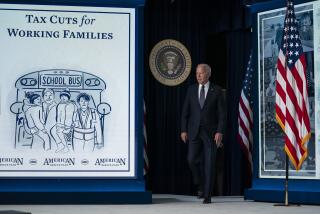Democrats Offer Bush a Compromise on Education
- Share via
WASHINGTON — Establishing their bottom line for a legislative deal on the White House’s top domestic priority, 10 centrist Senate Democrats have written President Bush that a bipartisan agreement on education reform “is well within our reach” if the administration backs off its demand for private school vouchers and agrees to substantially increase federal education spending.
In the letter, which will be sent to Bush on Monday, the potentially decisive voting bloc of Democratic moderates embraces many of the goals contained in the education reform blueprint Bush sent Congress last month. But the group, led by Sens. Joseph I. Lieberman of Connecticut and Evan Bayh of Indiana, urges four specific changes in Bush’s plan, primarily to ensure that more federal aid is targeted toward students in low-income families.
“If we are demanding high standards of accountability for public schools, particularly those in disadvantaged communities, then we must provide them with additional resources to help them meet these new benchmarks,” write the senators, according to a text of the letter obtained by The Times.
The letter’s net effect is to provide Bush for the first time a complete road map of the changes he may have to consider to gain support for his plan from the moderates who are his most likely Democratic allies on education reform. With the Senate divided 50-50 between the parties, Bush would need votes from at least 10 Democrats to break a filibuster if more liberal Democrats launched one against his education plan.
Exactly 10 Senate Democrats, including Dianne Feinstein of California, signed the letter. An equal number of centrist House Democrats also signed it.
Informed about the letter Saturday, one White House official said it suggested “there was a lot of common ground to build upon.” But the official, who requested anonymity, added that Bush “is committed to the comprehensive reform plan he outlined in January,” including the provisions for private school vouchers.
In the letter, the Democrats, most affiliated with the centrist Democratic Leadership Council, endorse many of the central principles of Bush’s education plan. “There is already significant consensus on many basic elements of reform,” the group writes, noting the overlap on several fronts between Bush’s plan and education reform legislation that Bayh and Lieberman already have introduced.
Specifically, the group endorses Bush’s proposals to give local districts more flexibility in spending federal money, streamline federal education regulation, expand the number of charter schools and provide states financial penalties or bonuses depending on whether they improve student performance.
But the group urges a much larger increase in federal education spending than Bush has proposed. The Democrats argue that Washington should provide $7 billion a year more in education aid over the next five years, with about two-thirds of the additional money going toward Title I, the massive federal program that funds remedial help for students in low-income families.
Second, the group says that the education bill should target more of the Title I money toward the very poorest communities. Many Democrats believe the current allocation formulas divide the money among too many middle-class districts; Bush’s proposal did not address the issue.
Third, while broadly endorsing Bush’s proposal to consolidate all federal education programs into a few block grants that would give states more flexibility in spending the money, the group says the plan must establish more safeguards to ensure that states and districts don’t divert the money from programs for students from low-income households.
Finally, the group reiterates its opposition to Bush’s call for school vouchers. Bush proposed that, when public schools fail to improve student performance for three consecutive years, Washington should divert part of the schools’ federal aid into $1,500-a-year vouchers that low-income parents could use to pay for after-school tutoring or private school tuition for their children.
Instead, the Democrats say Washington should provide districts with money to intervene in those failing schools but require “strong corrective actions,” such as hiring a new staff, converting the schools into charter schools and allowing students to transfer to better-performing public schools.
Bush moved toward the Democrats by adding similar proposals to his education blueprint last month. But he argues that, while struggling schools undertake those reforms, students from low-income families should be provided other opportunities, including the chance to attend private schools.
In private talks with Republicans, Bayh and Lieberman have floated a compromise that would provide the parents of children in failing schools vouchers that could not be used for private school tuition but would instead be limited to after-school tutoring. In addition, the Democratic proposal would fund the vouchers with additional money instead of taking existing federal aid from the failing schools, as Bush has proposed.
The Democrats’ letter, however, does not refer to that idea. That omission may reflect the resistance that even a diluted version of vouchers faces in the Democratic Senate caucus--and suggest that the centrist Democrats may ultimately have to split with many of their colleagues to reach a deal with Bush.
More to Read
Get the L.A. Times Politics newsletter
Deeply reported insights into legislation, politics and policy from Sacramento, Washington and beyond. In your inbox twice per week.
You may occasionally receive promotional content from the Los Angeles Times.










